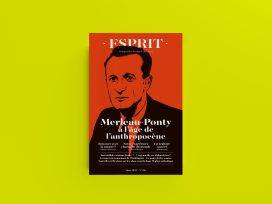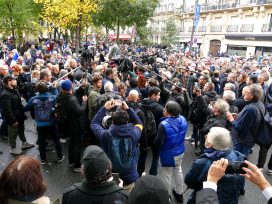Abstracts Esprit 5/2005
MARC-OLIVIER PADIS
Has France lost its European vision?
Whether out of political disillusionment or otherwise, the referendum campaign has unexpectedly exacerbated political tension in France while making the outcome of the vote on the constitutional treaty rather unpredictable. The country is switching back to the sultry mood that resulted in the April 2002 shock (when the extreme-rightwing candidate eliminated the leftwing contender from the presidential run-off), which goes to show how out of touch France has become with Europe. In addition, it points to France’s inability to establish a fresh relationship with the EU.
JEAN-PIERRE DUPUY
From Lisbon 1755 to Sumatra 2005, still none the wiser vis-à-vis evil
The Asian tsunami left everyone dismayed, as though every disaster must take us by surprise and have us transfixed in amazement. However, revisiting the discussions between Leibniz, Voltaire, and Rousseau in the aftermath of the 1755 Lisbon earthquake is as good an opportunity as any to resume a reflection on evil and pave the way for an ethic for our finite condition.
JEAN-LOUIS SCHLEGEL & MARIE-ODILE MÉTRAL
Stanislas Breton (1912-2005): A maverick and illuminating metaphysician
“I am someone from the Roman Middle Ages, born in an Athens suburb under a Judah tree” was how our recently-deceased friend, Stanislas Breton, once introduced himself. Unrivalled as a metaphysician (Du principe), a theologian of the Cross in resonance with Ricœur and de Certeau as well as an ardent Spinoza scholar, Breton was more inclined to meditate over birth and childhood than death. After an outline of his intellectual journey by Jean-Louis Schlegel, Marie-Odile Métral illustrates Breton’s “maverick philosophy” with a choice of excerpts from his work.
RAYMOND COURT
Reason and religion: About the Habermas-Ratzinger debate
In an unusual conversation, a translation of which was published in the July 2004 issue of Esprit, the Frankfurt philosopher and the cardinal who was to become Pope Benedict XVI each expressed an unexpected perspective. For all his conservative reputation, the cardinal proved to be quite distanced from encyclical dogmatism. To what extent can such a debate shed light on the foundations and legitimacy of the liberal democratic state that was under discussion? And can it be seen as a harbinger of the new pontiff’s policies?
JOËL ROMAN
A lost world: Four thinkers of the past century (on Sartre, Nizan, Mounier, and Aron)
All born in 1905 and equally dissatisfied with academic rationalism, these four thinkers were mesmerized by the major challenges of their time: social issues for Nizan, the crisis in civilization for Mounier, the philosophy of history for Aron, and freedom for Sartre. In what sense can we still think of them as models?
GASTON HELCINEL
A century beyond good and evil: On Alain Badiou’s Le Siècle
Questioning various thinkers’ perspectives on the past century is a challenge requiring intellectual brilliance, and French philosopher Alain Badiou is up to the challenge. However, his is a rather polemical turn of mind that does not shy away from questioning democracy on behalf of a political enthusiasm seeking to assert itself beyond Good and Evil.
MICHAËL FSSEL
The derision of Michel Onfray’s atheism
The many readers of Onfray’s recently published Traité d’Athéologie [Treatise on A-theology] have probably been appalled at the shallow thinking behind this caricature of a nineteenth-century pharmacist’s rationalist creed. This is overlooking the fact that atheism is as demanding as any other line of thought.
OLIVIER MONGIN
B.-H. Lévy and “where it’s all happening”
Since his first book (on Bangladesh), B.-H. Lévy has explicitly opted for the mass media as a privileged conduit for his messages from “where it’s all happening”. So should we slam him for being a media beast devoid of any proper thought? His strategy has run along and encouraged an epochal change in intellectual life spurred on by a war mentality (partly a legacy of the extreme leftwing) and the emergence of a hybrid genre: intellectual journalism.
PHILIPPE MENGUE
Intellectuals and the critical eye
How do we account for the difficulty of a philosopher like Gilles Deleuze in separating radical philosophical exigency from a political debate whose specific limitations and constraints cannot be overlooked? Far from spelling the end of thinking, the end of revolutionary dogma compels us to evolve a genuinely democratic critical style.
JACQUES DONZELOT
Pataphysical sociology at Nanterre University: Memories of joint tuition with Jean Baudrillard
In the late 1970s and early 1980s, a joint course defied academic convention and combined a philosopher’s and a sociologist’s perspectives on contemporary reality. With the benefit of hindsight, the dialogue between the two professors evinced very telling disagreements over sexual liberation, social inertia, or the potential for a political renewal.
Interview with JOSEPH BAHOUT
Beirut’s awakening
The massive crowds that gathered in Martyrs’ Square following the assassination of Rafik Hariri highlighted the gap between a whole generation’s uprising and conventional politicians. They also evinced the split between Christians, Sunnis, and Druze on the one hand, and on the other hand Shi’ites, who must face up to the disarmament of Hizbollah. If Syria’s stronghold loosens, one must also contend with all the factors that hinder vital political reform.
SAMIR FRANGIEH
The state and religious war: Lebanon, Hizbollah’s policies, and the Shi’ite conundrum
Since the multinational pact in 1943, the Lebanese state is poised on a delicate balance. Whereas any “Lebanese re-awakening” must be matched by formal recognition of the Shi’ite community, how does the country re-build state institutions and evolve a group of leaders without strengthening confessional borderlines? Is it possible to impose common rules over all Lebanese communities in the name of some general interest? Naturally, this question is also valid for Iraq.
HENRY LAURENS
The Middle East powder-keg between conventional terror and Hizbollah’s graduated violence
The author of The Palestine Issue revisits the origins of the various forms of violence and terror that have evolved over the course of the conflict between Israel and Palestine. After a look at the early stages from 1930 onwards, the historian assesses the second Intifada and Hizbollah, the latter being specific for a graduated use of violence which evokes contrasting reactions in France and the USA.
PHILIPPE DROZ-VINCENT
America’s nine-day wonder in the Middle East
What with the war in Iraq, pressures on Iran and Syria, and a fresh involvement in the conflict between Israel and Palestine, the Middle East is the focus of American diplomacy. How can the US overcome the inconsistencies in its grand plan for “imperial democratization”?
CLÉMENCE MAYOL
Democracy for petro-monarchies: The case of Oman
The US war in Iraq is said to be the first stage in a sweeping drive toward democracy in the Middle East, from Egypt to Saudi Arabia. A close assessment of ongoing reform in Oman can only suggest a less-idealized perspective, rather at odds with the mirage of “democracies without democrats”.
Published 6 May 2005
Original in French
Contributed by Esprit © Esprit
PDF/PRINTNewsletter
Subscribe to know what’s worth thinking about.



